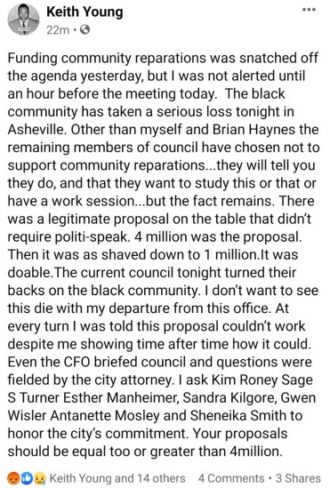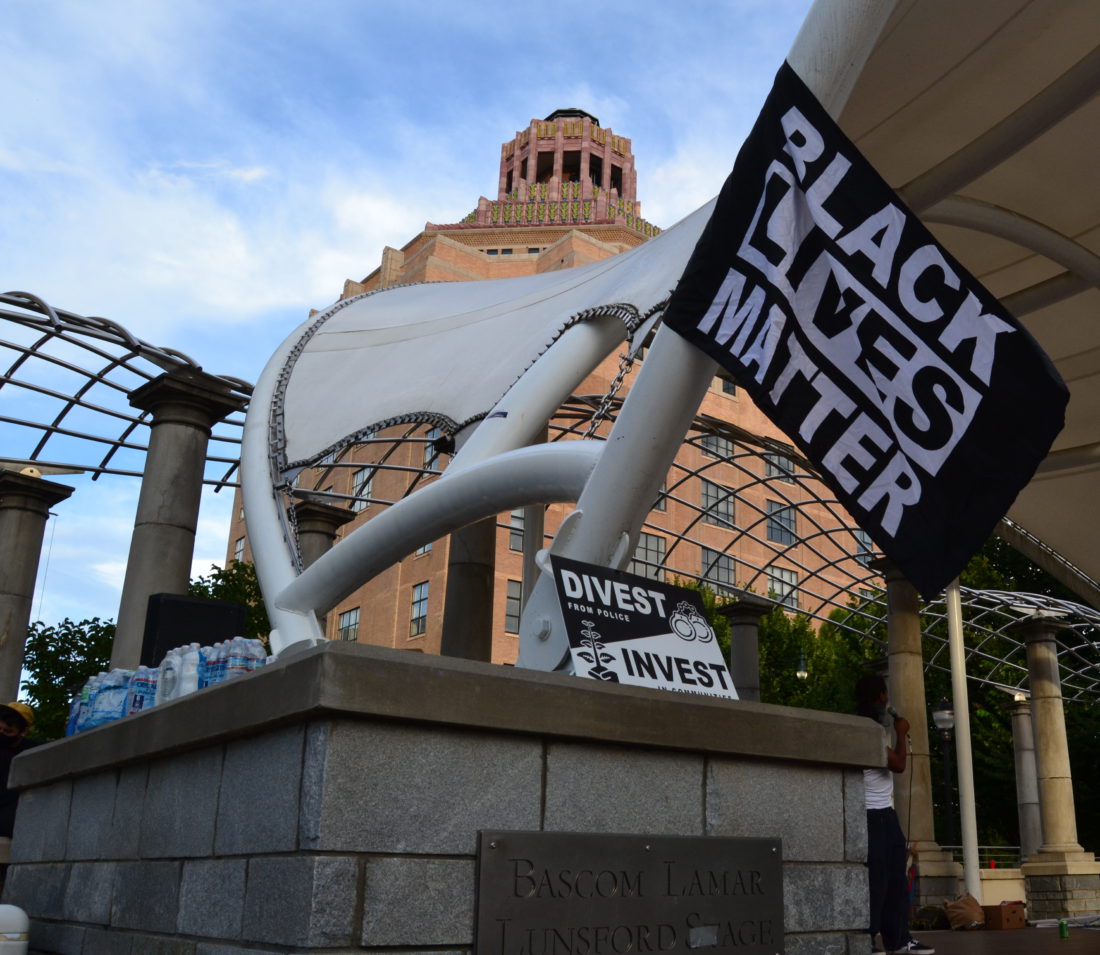It wasn’t the ending Keith Young wanted.
At its meeting of Nov. 10, Asheville City Council said its goodbyes to three outgoing members: Young, Brian Haynes and Julie Mayfield. But the bittersweet moment left a bitter taste for many residents — the farewells came after Mayor Esther Manheimer abruptly announced that Council would not discuss the creation of a $1 million reparations fund, a move Young had championed as his last act on Council.
Manheimer explained that she had been asked by “more than a majority” of Council to pull the funding resolution from the agenda until incoming members Sandra Kilgore, Sage Turner and Kim Roney could attend a work session to “develop a roadmap” for reparations funding.
“Frankly, we haven’t had time yet to discuss in-depth in terms of how to move forward,” Manheimer said. “So let me reiterate: Council remains unanimously supportive of the reparations resolution already adopted.”
The unanimously adopted July reparations agreement — also spearheaded by Young — directs City Manager Debra Campbell to develop recommendations to “address the creation of generational wealth” in the Black community and establish a commission to “make significant progress toward repairing the damage caused by public and private systemic racism.” At Council’s meeting of Oct. 27, members supported a resolution to halt the sale of city-owned property acquired through urban renewal.

But in a Facebook post shared after the meeting, Young, who unofficial results show will lose his seat after a fourth-place finish in this year’s City Council race, said that Haynes was the only other member who supported immediate funding for reparations. As of press time, the post had been deleted.
“There was a legitimate proposal on the table that didn’t require politi-speak,” Young wrote, adding that he had only been informed that his resolution would be off the agenda about an hour before the meeting. “$4 million was the proposal. Then it was shaved down to $1 million. It was doable. The current Council tonight turned their backs on the Black community.”
Community members, also frustrated that hadn’t been informed of the agenda change until they called into the virtual speaker queue at the start of the meeting, urged Council to invest far more than Young’s original proposal into an eventual reparations fund.
“$4 million is frankly laughable when you consider the unbelievable harm that has been done to the Black community over the years,” said Paul Schulman of West Asheville. “For that to be removed at the last minute is really disheartening and sad.”
Taking reparations funding off the table is the equivalent of being at a football game on a fourth down at the one-yard line and deciding to take a knee instead of finishing the play, said Rob Thomas of the Racial Justice Coalition.
“I see this as political maneuvering,” Thomas said. “But maybe this isn’t a bad thing. Maybe you’re planning to put a lot more money into reparations for the Black community than the $4 million. Maybe you will do better. We’ll be watching.”
In other news
Other highlights from Council’s meeting of Nov. 10 include:
- Changes to Asheville’s Land Use Incentive Grant policy. The newly amended policy will require at least 20% of a developer’s units to meet affordability standards for households earning 80% or less of the area median income, up from a previous requirement of 10%, to receive a city subsidy.
- Budget amendments to accept $889,456 from the third round of federal Community Development Block Grant Coronavirus relief funds to offset costs of the city’s response to the COVID-19 pandemic.
- A resolution to help fund free internet services for residents in the Southside community, Hillcrest Apartments, Pisgah View Apartments, Klondyke Homes and Deaverview Apartments. The city is responsible for $50,000 of the project’s $520,000 overall cost.
- A $560,000 contract extension with Young Transportation to continue supplemental transit services during the COVID-19 pandemic.
- Resolutions of appreciation for Haynes, Mayfield and Young.




More unfulfilled government promises to this community.
I’ve been observing the reparations discussion for awhile now, and have a couple of questions that perhaps those who know more than I do can respond to. Because the reparations would be distributed among those now living, I will assume that the $4 million plus that Rob Thomas of the Racial Justice Coalition wants is for those folks that Paul Schulman of West Asheville says have suffered “unbelievable harm over the years”.
1. What “harm” is Mr. Schulman and others talking about….police brutality? being told they cannot live in a certain neighborhood? being turned away from a job opening due to color tone of their skin? Seriously, I simply have not heard of any specific events (other than the rough handling of a young man for jay walking a few years ago) nor witnessed any such biased incidents, and it’s not like I am not exposed to such situations, and I have many acquaintances of color.
2. I believe the African American population of Asheville in 2019 was about 12,000. So would this be a cash distribution, each person of color receiving about $330?
3. If we can agree that one of the more obvious issues in the Community is education in order to command good jobs and salaries, how will this help? Further, if we can also agree that strong family ties and support are essential to child development leading to motivation to excel, good study habits, respecting authority, etc., how will this help?
4. Has anyone, either an African American or Caucasian organization, ever considered that the deaths of nearly 400,000 young men from the North that enabled the promise of the Emancipation Proclamation to provide for the freedom of slaves, might indeed be considered appropriate “reparations”?
I look forward to, and thank in advance, those who might offer helpful insights in response to the above questions.
The reparations issue is not and has never been a serious attempt at improving anyone’s condition except that of politicians trolling for votes. If it were, then discussing allocation of public funds would have come BEFORE putting trash bags over monuments and painting slogans on roadways.
Useful questions. Can a MX reporter go into further analysis/reporting?
With respect to point 4, that particular formulation has been considered and found wanting, given that it was followed by a century of white supremacist terrorism, debt peonage, land and wage theft, Jim Crow, disenfranchisement, housing and mortgage discrimination, etc. The abiding mission of the federal government has been to turn individuals into property-owning citizens, with one exception.
As Ta-Nehisi Coates put it, the question of reparations is not about a payoff or a handout, but a national reckoning with how the wealth gap is the product of multi-generational plunder.
https://www.theatlantic.com/magazine/archive/2014/06/the-case-for-reparations/361631/
Whether City Council has the capacity to be part of that is another question.
Richard, there is, of course, no plan. Just a quick fire headline grabbing reparations agreement. Good bye, Mr. Young. Although you lost the election, on a positive note you don’t need to pretend to live here anymore.
Goodbye young. The voters have spoken and are tired of your ineffective leadership.
So, let me ask, are the numerous new (and old) taxpayers who never owned slaves, were from places that opposed slavery, and had their family members die opposing slavery be exempt from funding people that were never slaves and only shared their skin color? Should recipients have to prove their eligibility as having slaves as ancestors? What about people that lived in states that still had slavery after the war between the states?
See above.
It actually involves garnishing the paychecks of everyone who says “war between the states” unironically, and the amount is doubled if you say “war of northern aggression.” Hope that helps.